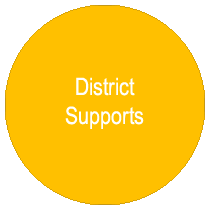Special Education Dispute Resolution
-
Parents of students with disabilities and school districts sometimes disagree as to what special education and related services are appropriate. Resolving differences or concerns in the least adversarial manner and closest to the school level is the best way. It is important to make your concerns known to your child’s teacher, and if unresolved, to the school’s administration. It is best to discuss your concerns and attempt to resolve them in an Individual Education Plan (IEP) meeting. Doing this allows for your concerns to be addressed in a timely manner that preserves relationships, and can result in better outcomes for the student as well as their family.
To support parents in this process, Hillsborough County Public Schools (HCPS) Exceptional Student Education Compliance and Staffing department provides resources and direct support to parents and schools when disagreements arise. Resources are available to assist you with understanding your rights as a parent of a student with disabilities and with answering any of your questions related to eligibility, identification, evaluation and/or placement.
While we encourage you to work with your child’s school directly to address any disagreements regarding your child’s special education and related services, HCPS has developed a system of supports for students with disabilities and their families.
-
Facilitated Individual Educational Plan (FIEP) Meeting
A Facilitated Individual Educational Plan (FIEP) meeting is a voluntary process that can be used when parties in an Individual Education Plan (IEP), Individual Family Service Plan (IFSP) or other meeting agree that the presence of a neutral third party would be beneficial in promoting effective communication and problem solving during an IEP meeting. It is most often used when there is a history of conflicts and disagreements between the family and school, the participants anticipate that they will be unable to reach agreement on critical issues, or when a meeting is expected to be particularly complex. Facilitators keep the lines of communication open among the IEP team members which leads to the development of an appropriate IEP for the student.
Facilitators often serve as special education mediators in their state and have received additional training beyond that which they received to become mediators. Additionally, many school districts have specially trained staff members to serve in their own schools, districts or regions, or to assist in others, to more effectively facilitate problematic IEP meetings.
-
Mediation
When parents and schools are unable to resolve their differences through the Individual Educational Plan (IEP) process, either party may request mediation. During mediation a trained ESE mediator guides the parent(s), school district or agency representative(s), and other parties through a structured problem-solving approach to resolve the issues.
Resources
-
State Complaints
Under the Individuals with Disabilities Education Act (IDEA), a Written State Complaint procedure must be available in every state. A written state complaint is used to communicate that a public agency has not followed the requirements of the Individuals with Disabilities Education Act (IDEA) and to request an investigation of the problem.
- IDEA Special Education Written State Complaints: A Guide for Parents of Children & Youth
- State Complaint Request Form - Non-fillable Form
-
Due Process Complaints / Hearing Requests
A due process complaint is a request to a local education agency (school district) and the State Education Agency for a hearing before an impartial hearing officer as a method for resolving a disagreement concerning the provision of free appropriate public education to a child who needs or is suspected of needing of special education and related services.
Resolution meetings, often referred to as “resolution sessions”, are required under federal law as an opportunity for families and schools to resolve issues raised in a due process complaint, in a less formal process and setting.
- Request for ESE Due Process Form
- IDEA Special Education Due Process Complaints/Hearing Requests- Including Expedited Hearing Requests: A Guide for Parents of Children & Youth
- Due Process Filing Checklist
- Report of Due Process Resolution Information Prior to Hearing
- Resolution Meetings
-
Contacts
(813) 273-7060
System of Supports
-

Teacher(s)
Therapist(s)
-

Principal
Assistant Principal
ESE Specialist
ESE Case Manager
School Guidance Counselor
School Psychologist
School Social Worker
-

Supervisor of Staffing
Supervisor of Compliance
Staffing Specialists
ESE Regional Supervisor
ESE District Resource Teacher
Regional Superintendent
-

Assistant Director for Compliance and Staffing
Program Supervisors
District Resource Teachers
General Director of Exceptional Student Education

